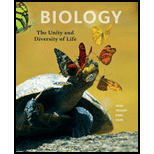
Concept explainers
Introduction: For large polar molecules and ions, there are special protein called transport protein through which they cross the lipid bilayer. Some transport proteins form pores. Others are gated that close in response to a stimulus. Active transport is a transport where protein pumps a solute across a cell membrane against the solutes concentration gradient which requires energy. Passive transport does not need energy for transport to occur. Facilitated diffusion is a type of passive transport in which solute follows its concentration gradient across a membrane by moving through a transport protein. Osmosis is an example of passive transport, a membrane-crossing mechanism that requires no energy input.
Want to see the full answer?
Check out a sample textbook solution
Chapter 5 Solutions
Biology: The Unity and Diversity of Life (MindTap Course List)
- How does the cost of food affect the nutritional choices people make?arrow_forwardBiopharmaceutics and Pharmacokinetics:Two-Compartment Model Zero-Order Absorption Questions SHOW ALL WORK, including equation used, variables used and each step to your solution, report your regression lines and axes names (with units if appropriate) :Calculate a-q a) B1, b) B2, c) hybrid rate constant (1) d) hybrid rate constant (2) e) t1/2,dist f) t1/2,elim g) k10 h) k12 i) k21 j) initial concentration (C0) k) central compartment volume (V1) l) steady-state volume (Vss) m) clearance (CL) AUC (0→10 min) using trapezoidal rule n) AUC (20→30 min) using trapezoidal rule o) AUCtail (AUC360→∞) p) total AUC (using short cut method) q) volume from AUC (VAUC)arrow_forwardWhat are some external influences that keep people from making healthy eating decisions?arrow_forward
- What type of structure(s) would you expect to see in peripheral membrane proteins? (mark all that apply) A. Amphipathic alpha helix (one side is hydrophilic and one side is hydrophobic) B. A hydrophobic beta barrel C. A hydrophobic alpha helix D. A chemical group attached to the protein that can anchor it to the membranearrow_forwardTemporal flexibility (the ability to change over time) of actin structures within a cell is maintained by… A. The growth/shrinkage cycle B. Periodic catastrophe C. GTP hydrolysis D. Treadmilling E. None of the abovearrow_forwardDuring in vitro polymerization of actin and microtubule filaments from their subunits, what causes the initial delay in filament growth? A.Nucleation B.Reaching homeostasis C.Nucleotide exchange D.ATP or GTP hydrolysis E.Treadmillingarrow_forward
- You expect to find which of the following in the Microtubule Organizing Center (MTOC)...(mark all that apply) A. Gamma tubulin B. XMAP215 C. Centrioles D. Kinesin-13arrow_forwardThe actin-nucleating protein formin has flexible “arms” containing binding sites that help recruit subunits in order to enhance microfilament polymerization. What protein binds these sites? A.Thymosin B.Profilin C.Cofilin D.Actin E.Tropomodulinarrow_forwardWhile investigating an unidentified motor protein, you discover that it has two heads that bind to actin. Based on this information, you could confidently determine that it is NOT... (mark all that apply) A. A myosin I motor B. A dynein motor C. A myosin VI motor D. A kinesin motorarrow_forward
- You isolate the plasma membrane of cells and find that . . . A. it contains regions with different lipid compositions B. it has different lipid types on the outer and cytosolic leaflets of the membrane C. neither are possible D. A and B both occurarrow_forwardYou are studying the mobility of a transmembrane protein that contains extracellular domains, one transmembrane domain, and a large cytosolic domain. Under normal conditions, this protein is confined to a particular region of the membrane due to the cortical actin cytoskeletal network. Which of the following changes is most likely to increase mobility of this protein beyond the normal restricted region of the membrane? A. Increased temperature B. Protease cleavage of the extracellular domain of the protein C. Binding to a free-floating extracellular ligand, such as a hormone D. Protease cleavage of the cytosolic domain of the protein E. Aggregation of the protein with other transmembrane proteinsarrow_forwardTopic: Benthic invertebrates as an indicator species for climate change, mapping changes in ecosystems (Historical Analysis & GIS) What objects or events has the team chosen to analyze? How does your team wish to delineate the domain or scale in which these objects or events operate? How does that limited domain facilitate a more feasible research project? What is your understanding of their relationships to other objects and events? Are you excluding other things from consideration which may influence the phenomena you seek to understand? Examples of such exclusions might include certain air-born pollutants; a general class of water bodies near Ottawa, or measurements recorded at other months of the year; interview participants from other organizations that are involved in the development of your central topic or issue. In what ways do your research questions follow as the most appropriate and/or most practical questions (given the circumstances) to pursue to better understand…arrow_forward
 Medical Terminology for Health Professions, Spira...Health & NutritionISBN:9781305634350Author:Ann Ehrlich, Carol L. Schroeder, Laura Ehrlich, Katrina A. SchroederPublisher:Cengage Learning
Medical Terminology for Health Professions, Spira...Health & NutritionISBN:9781305634350Author:Ann Ehrlich, Carol L. Schroeder, Laura Ehrlich, Katrina A. SchroederPublisher:Cengage Learning
 Concepts of BiologyBiologyISBN:9781938168116Author:Samantha Fowler, Rebecca Roush, James WisePublisher:OpenStax College
Concepts of BiologyBiologyISBN:9781938168116Author:Samantha Fowler, Rebecca Roush, James WisePublisher:OpenStax College





